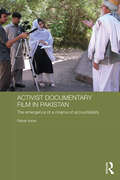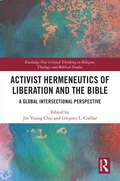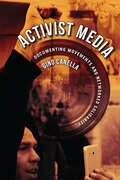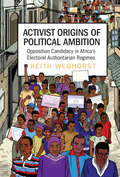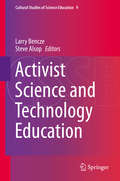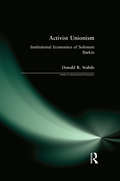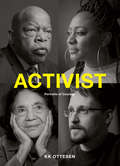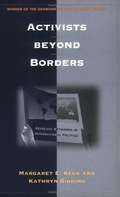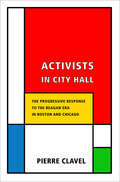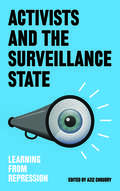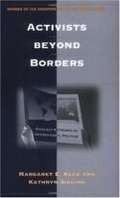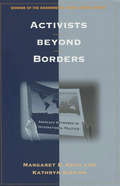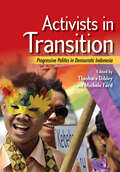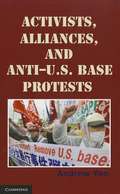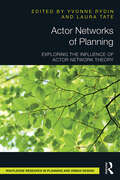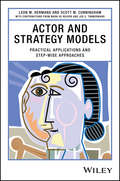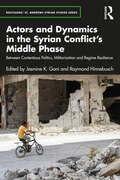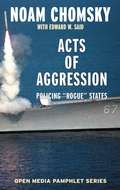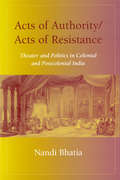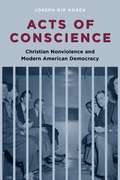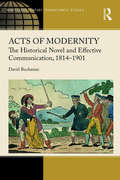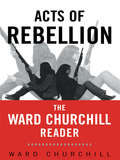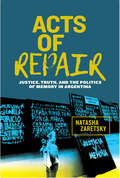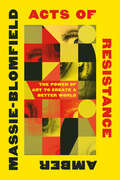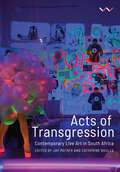- Table View
- List View
Activist Documentary Film in Pakistan: The Emergence of a Cinema of Accountability (Routledge Contemporary South Asia Series)
by Rahat ImranThis book, the first academic book on Pakistani documentary cinema, traces the development of activist filmmaking practices in Pakistan which have emerged as a response to the consequences of religious fundamentalism, extremism, and violation of human rights. Beginning with the period of General Zia-ul-Haq’s Islamization process (1977-88), it discusses a selection of representative documentary films that have critically addressed and documented the various key transformations, events, and developments that have shaped Pakistan’s socio-political, socio-economic, and cultural history. Such activist filmmaking practice in Pakistan is today an influential factor in addressing the politics, and negative and oppressive effects of the Islamization era, discriminatory laws, particularly gender-discriminatory Sharia laws, violation of human and citizen rights, authoritarianism, internal strife, the spread of religious fundamentalism, and the threat of Talibanization, and oppressive tribal customs and traditions. The contribution of Pakistani documentary filmmakers stands as a significant body of work that has served the cause of human rights, promoting awareness and social change in Pakistan, particularly regarding gender rights.
Activist Hermeneutics of Liberation and the Bible: A Global Intersectional Perspective (Routledge New Critical Thinking in Religion, Theology and Biblical Studies)
by Jin Young Choi Gregory L. CuéllarInspired by the current political moment around the globe in which uprisings, protests, revolutions, and movements are on the rise, this book examines the intersections between the Bible and activism. It does this by showcasing intersectional readings of the Bible as an activist act and a tool for activism; historicizing the uses of the Bible within activist/freedom movements around the globe; and offering activist approaches to teaching the Bible.Each chapter in this volume provides a critical and substantive response from the discipline of Biblical Studies to global political trends. International in scope, with contributors from Africa, Asia, Caribbean, Europe, Latin America, Oceania and the United States, they address themes such as gender politics, racial injustices, violence toward women, political resistance, and activist hermeneutics and pedagogies. Together they harness the intellectual energies of minoritized Biblical scholars in a nonessentialist manner to reflect on the Bible as a tool for liberating social and political change. Reflecting on the activist potential of the Bible, this book will be of keen interest to scholars in Biblical Studies, Political Theology, and Religious Studies.
Activist Media: Documenting Movements and Networked Solidarity
by Gino CanellaNow more than ever, activists are using media to document injustice and promote social and political change. Yet with so many media platforms available, activists sometimes fail to have a coherent media and communication strategy. Drawing from his experiences as a documentary filmmaker with Black Lives Matter 5280 and Service Employees International Union (SEIU) Local 105 in Denver, Colorado, Gino Canella argues that activist media create opportunities for activists to navigate conflict and embrace their political and ideological differences. Canella details how activist media practices—interviewing organizers, script writing, video editing, posting on social media, and hosting community screenings—foster solidarity among grassroots organizers. Informed by media theory, this book explores how activists are using media to mobilize supporters, communicate their values, and reject anti-union rhetoric. Furthermore, it demonstrates how collaborative media projects can help activists build broad-based coalitions and amplify their vision for a more equitable and just society.
Activist Origins of Political Ambition: Opposition Candidacy in Africa's Electoral Authoritarian Regimes
by Keith WeghorstWhy do people run for office with opposition parties in electoral authoritarian regimes, where the risks of running are high, and the chances of victory are bleak? In Activist Origins of Political Ambition, Keith Weghorst offers a theory that candidacy decisions are set in motion in early life events and that civic activism experiences and careers in civil society organizations funnel aspirants towards opposition candidacy in electoral authoritarian regimes. The book also adapts existing explanations of candidacy decisions derived from leading democracies that can be applied to electoral authoritarian contexts. The mixed-methods research design features an in-depth study of Tanzania using original survey data, sequence methods, archival research, and qualitative data combined with an analysis of legislators across authoritarian and democratic regimes in Africa. A first-of-its kind study, the book's account of the origins of candidacy motivations offers contributions to its study in autocracies, as well as in leading democracies and the United States.
Activist Science and Technology Education (Cultural Studies of Science Education #9)
by Larry Bencze Steve AlsopThis collection examines issues of agency, power, politics and identity as they relate to science and technology and education, within contemporary settings. Social, economic and ecological critique and reform are examined by numerous contributing authors, from a range of international contexts. These chapters examine pressing pedagogical questions within socio-scientific contexts, including petroleum economies, food justice, health, environmentalism, climate change, social media and biotechnologies. Readers will discover far reaching inquiries into activism as an open question for science and technology education, citizenship and democracy. The authors call on the work of prominent scholars throughout the ages, including Bourdieu, Foucault, Giroux, Jasanoff, Kierkegaard, Marx, Nietzsche, Rancière and Žižek. The application of critical theoretical scholarship to mainstream practices in science and technology education distinguishes this book, and this deep, theoretical treatment is complemented by many grounded, more pragmatic exemplars of activist pedagogies. Practical examples are set within the public sphere, within selected new social movements, and also within more formal institutional settings, including elementary and secondary schools, and higher education. These assembled discussions provide a basis for a more radically reflexive reworking of science and technology education. Educational policy makers, science education scholars, and science and technology educators, amongst others, will find this work thought-provoking, instructive and informative.
Activist Unionism: Institutional Economics of Solomon Barkin
by Donald R. StabileFirst Published in 1994. Routledge is an imprint of Taylor & Francis, an Informa company.
Activist: Portraits of Courage
by KK OttesenA speech on the radio. A high school literature class. A promise made to a mother.Activism begins in small ways and in unexpected places. In this inspiring book, over forty activists from Billie Jean King to Senator Bernie Sanders and Grover Norquist to Al Sharpton recount the experiences that sparked their journeys and share the beliefs that keep them going. These are citizens who met challenge with action. Their visions for peace, equality, and justice have reshaped American society—from voting to reproductive rights, and from the environment to the economy.• Brings together multiple generations from different (sometimes opposite perspectives)• Features KK Ottesen's luminous photographs revealing passion, purpose and optimism• Powerful narratives that collective remind us that anyone can take the future into their own handsFans of 1960Now, Martha Rosler: Irrespective, and Charles White: A Retrospective will love this book. This book is perfect for:• Activists, old and new• Politically engaged readers • Photography fans• Millennials
Activists Beyond Borders: Advocacy Networks in International Politics
by Margaret E. Keck Kathryn SikkinkSurvey of non-governmental organizations' role in pressing for improvements in areas such as human rights, environmental stewardship and more.
Activists In City Hall
by Pierre ClavelIn 1983, Boston and Chicago elected progressive mayors with deep roots among community activists. Taking office as the Reagan administration was withdrawing federal aid from local governments, Boston's Raymond Flynn and Chicago's Harold Washington implemented major policies that would outlast them. More than reforming governments, they changed the substance of what the government was trying to do: above all, to effect a measure of redistribution of resources to the cities' poor and working classes and away from hollow goals of "growth" as measured by the accumulation of skyscrapers. In Boston, Flynn moderated an office development boom while securing millions of dollars for affordable housing. In Chicago, Washington implemented concrete measures to save manufacturing jobs, against the tide of national policy and trends. Activists in City Hall examines how both mayors achieved their objectives by incorporating neighborhood activists as a new organizational force in devising, debating, implementing, and shaping policy. Based in extensive archival research enriched by details and insights gleaned from hours of interviews with key figures in each administration and each city's activist community, Pierre Clavel argues that key to the success of each mayor were numerous factors: productive contacts between city hall and neighborhood activists, strong social bases for their agendas, administrative innovations, and alternative visions of the city. Comparing the experiences of Boston and Chicago with those of other contemporary progressive cities-Hartford, Berkeley, Madison, Santa Cruz, Santa Monica, Burlington, and San Francisco-Activists in City Hall provides a new account of progressive urban politics during the Reagan era and offers many valuable lessons for policymakers, city planners, and progressive political activists.
Activists and the Surveillance State: Learning from Repression
by Aziz ChoudryThe use of secret police, security agencies and informers to spy on, disrupt and undermine opposition to the dominant political and economic order has a long history. This book reflects on the surveillance, harassment and infiltration that pervades the lives of activists, organizations and movements that are labelled as ‘threats to national security’. Activists and scholars from the UK, South Africa, Canada, the US, Australia and Aotearoa/New Zealand expose disturbing stories of political policing to question what lies beneath state surveillance. Problematizing the social amnesia that exists within progressive political networks and supposed liberal democracies, Activists and the Surveillance State shows that ultimately, movements can learn from their own repression, developing a critical and complex understanding of the nature of states, capital and democracy today that can inform the struggles of tomorrow.
Activists beyond Borders
by Margaret E. Keck Kathryn SikkinkA masterful combination of emerging theory and empirical comparison of one of the most intriguing areas of transnational politics. Keck and Sikkink access a broad range of theory from social movements, international relations, and comparative politics research to glean from a wealth of their own research findings solid and thought-provoking conclusions about the most interesting and least well-understood area of contentious politics in the world today. -Sidney Tarrow, Cornell University (Government) "Activists beyond Borders is a searching exploration of advocacy networks, providing compelling accounts in areas such as human rights and environmental protection and an intriguing glimpse into the transnational politics of the twenty-first century. "-Robert O. Keohane, Duke University Margaret E. Keck and Kathryn Sikkink examine a type of pressure group that has been largely ignored by political analysts: networks of activists that coalesce and operate across national frontiers. Their targets may be international organizations or the policies of particular states. Historical examples of such transborder alliances include anti-slavery and woman suffrage campaigns. In the past two decades, transnational activism has had a significant impact in human rights, especially in Latin America, and advocacy networks have strongly influenced environmental politics as well. The authors also examine the emergence of an international campaign around violence against women.
Activists beyond Borders: Advocacy Networks in International Politics
by Margaret E. Keck Kathryn SikkinkIn Activists beyond Borders, Margaret E. Keck and Kathryn Sikkink examine a type of pressure group that has been largely ignored by political analysts: networks of activists that coalesce and operate across national frontiers. Their targets may be international organizations or the policies of particular states. Historical examples of such transborder alliances include anti-slavery and woman suffrage campaigns. In the past two decades, transnational activism has had a significant impact in human rights, especially in Latin America, and advocacy networks have strongly influenced environmental politics as well. The authors also examine the emergence of an international campaign around violence against women.
Activists in Transition: Progressive Politics in Democratic Indonesia
Activists in Transition examines the relationship between social movements and democratization in Indonesia. Collectively, progressive social movements have played a critical role over in ensuring that different groups of citizens can engage directly in—and benefit from—the political process in a way that was not possible under authoritarianism. However, their individual roles have been different, with some playing a decisive role in the destabilization of the regime and others serving as bell-weathers of the advancement, or otherwise, of Indonesia's democracy in the decades since. Equally important, democratization has affected social movements differently depending on the form taken by each movement during the New Order period. The book assesses the contribution that nine progressive social movements have made to the democratization of Indonesia since the late 1980s, and how, in turn, each of those movements has been influenced by democratization.
Activists, Alliances, and Anti-U.S. Base Protests
by Andrew YeoAnti-U.S. base protests, played out in parliaments and the streets of host nations, continue to arise in different parts of the world. In a novel approach, this book examines the impact of anti-base movements and the important role bilateral alliance relationships play in shaping movement outcomes. The author explains not only when and how anti-base movements matter, but also how host governments balance between domestic and international pressure on base-related issues. Drawing on interviews with activists, politicians, policy makers and U.S. base officials in the Philippines, Japan (Okinawa), Ecuador, Italy and South Korea, the author finds that the security and foreign policy ideas held by host government elites act as a political opportunity or barrier for anti-base movements, influencing their ability to challenge overseas U.S. basing policies.
Actor Networks of Planning: Exploring the Influence of Actor Network Theory
by Yvonne Rydin Laura TatePlanning is centrally focused on places which are significant to people, including both the built and natural environments. In making changes to these places, planning outcomes inevitably benefit some and disadvantage others. It is perhaps surprising that Actor Network Theory (ANT) has only recently been considered as an appropriate lens through which to understand planning practice. This book brings together an international range of contributors to explore such potential of ANT in more detail. While it can be thought of as a subset of complexity theory, given its appreciation for non-linear processes and responses, ANT has its roots in the sociology of scientific and technology studies. ANT now comprises a rich set of concepts that can be applied in research, theoretical and empirical. It is a relational approach that posits a radical symmetry between social and material actors (or actants). It suggests the importance of dynamic processes by which networks of relationships become formed, shift and have effect. And while not inherently normative, ANT has the potential to strengthen other more normative domains of planning theory through its unique analytical lens. However, this requires theoretical and empirical work and the papers in this volume undertake such work. This is the first volume to provide a full consideration of how ANT can contribute to planning studies, and suggests a research agenda for conceptual development and empirical application of the theory.
Actor and Strategy Models: Practical Applications and Step-wise Approaches
by Scott W. Cunningham Leon M. HermansA practical how-to guide for more effective planningthrough multi-actor modelling Careful planning is the cornerstone of a successful initiative, and any plan, policy, or business strategy can only be successful if it has the support of different actors. These actors may beactively pursuing their own agendas, so the plan must not only offer an optimal solution to theproblem, but must also fit the needs and abilities of the actors involved. Actor and Strategy Models: Practical Applications and Step-wise Approaches provides a primer on multi-actormodelling, based on the fundamental premise that actor strategies are explained by investigatingwhat actors can do, think, and want to achieve. Covering a variety of models with detailed background and case examples, this book focuses on practical application. Step-by-step instructions for each approach provide immediately actionable insight, while a general framework for actor and strategy modelling allows the reader to tailor any approach as needed to optimize results in terms of situation-specific planning. Oriented toward real-world strategy, this helpful resource: • Provides models that shed light on the multi-actor dimensions of planning, using a variety of analytical approaches • Includes literature, theoretical underpinnings, and applications for each method covered • Clarifies the similarities, differences, and suitable applications between various actor modelling approaches • Provides a step-wise framework for actor and strategy modelling • Offers guidance for the identification, structuring, and measuring of values and perceptions • Examines the challenges involved in analyzing actors and strategies Even before planning begins, an endeavor’s success depends upon a clear understanding of the various actors involved in the planning and implementation stages. From game theory and argumentative analysis, through social network analysis, cognitive mapping, and beyond,Actor and Strategy Models provides valuable insight for more effective planning. Leon M. Hermans is an assistant professor at the Faculty of Technology, Policy, and Management at Delft University of Technology. His research focuses on the use of actor analysis methods to support public policy analysis and evaluation. Scott W. Cunningham is an associate professor at the Faculty of Technology, Policy, and Management at Delft University of Technology. He combines work in actor modelling and game theory with research in data mining, technology forecasting, and innovation.
Actors and Dynamics in the Syrian Conflict's Middle Phase: Between Contentious Politics, Militarization and Regime Resilience (Routledge/St. Andrews Syrian Studies Series)
by Jasmine K. GaniThis volume covers the "middle" time period of the Syrian uprising, roughly from 2012 when Syria’s peaceful protest began to mutate into a violent insurgency and civil war until roughly 2018 when the conflict took on features of a "frozen conflict". The middle period was important as one of key junctures or turning points when the struggle could have reached rather different outcomes. Non-violent protest failed to drive democratization and turned into violent insurrection but revolution from below also failed as did regime counter-insurgency, leaving protracted civil war the default outcome. Second, the consequences of civil war became evident with six themes: failing statehood coexisted with regime resilience; rebel governance emerged as a viable challenge to the regime; social forces were sharply polarized; external actors exacerbated internal divisions; a predatory war economy emerged; and intense violence led to massive displacement of the population. Taking an innovative and interdisciplinary approach that seeks to capture the full complexity of the phenomenon, this book contributes significantly to our understanding of the Syrian conflict, therefore it will be of interest to academics, students, journalists and policy-makers interested in the Syrian civil war.
Acts of Aggression: Policing Rogue States (Open Media Series #No. 13)
by Noam Chomsky Edward W. Said Ramsey ClarkIn Acts of Aggression three distinguished activist scholars examine the background and ramifications of the U.S. conflict with Iraq. Through three separate essays, the pamphlet provides an in-depth analysis of U.S./Arab relations, the contradictions and consequences of U.S. foreign policy toward "rogue states," and how hostile American actions abroad conflict with UN resolutions and international law.
Acts of Authority/Acts of Resistance: Theater and Politics in Colonial and Postcolonial India
by Nandi BhatiaDespite its importance to literary and cultural texts of resistance, theater has been largely overlooked as a field of analysis in colonial and postcolonial studies. Acts of Authority/Acts of Resistance seeks to address that absence, as it uniquely views drama and performance as central to the practice of nationalism and anti-colonial resistance. Nandi Bhatia argues that Indian theater was a significant force in the struggle against oppressive colonial and postcolonial structures, as it sought to undo various schemes of political and cultural power through its engagement with subjects derived from mythology, history, and available colonial models such as Shakespeare. Bhatia's attention to local histories within a postcolonial framework places performance in a global and transcultural context. Drawing connections between art and politics, between performance and everyday experience, Bhatia shows how performance often intervened in political debates and even changed the course of politics. One of the first Western studies of Indian theater to link the aesthetics and the politics of that theater, Acts of Authority/Acts of Resistance combines in-depth archival research with close readings of dramatic texts performed at critical moments in history. Each chapter amplifies its themes against the backdrop of specific social conditions as it examines particular dramatic productions, from The Indigo Mirror to adaptations of Shakespeare plays by Indian theater companies, illustrating the role of theater in bringing nationalist, anticolonial, and gendered struggles into the public sphere.
Acts of Conscience: Christian Nonviolence and Modern American Democracy (Columbia Studies in Contemporary American History)
by Joseph Kip KosekIn response to the massive bloodshed that defined the twentieth century, American religious radicals developed a modern form of nonviolent protest, one that combined Christian principles with new uses of mass media. Greatly influenced by the ideas of Mohandas Gandhi, these "acts of conscience" included sit-ins, boycotts, labor strikes, and conscientious objection to war. Beginning with World War I and ending with the ascendance of Martin Luther King Jr., Joseph Kip Kosek traces the impact of A. J. Muste, Richard Gregg, and other radical Christian pacifists on American democratic theory and practice. These dissenters found little hope in the secular ideologies of Wilsonian Progressivism, revolutionary Marxism, and Cold War liberalism, all of which embraced organized killing at one time or another. The example of Jesus, they believed, demonstrated the immorality and futility of such violence under any circumstance and for any cause. Yet the theories of Christian nonviolence are anything but fixed. For decades, followers have actively reinterpreted the nonviolent tradition, keeping pace with developments in politics, technology, and culture. Tracing the rise of militant nonviolence across a century of industrial conflict, imperialism, racial terror, and international warfare, Kosek recovers radical Christians' remarkable stance against the use of deadly force, even during World War II and other seemingly just causes. His research sheds new light on an interracial and transnational movement that posed a fundamental, and still relevant, challenge to the American political and religious mainstream.
Acts of Modernity: The Historical Novel and Effective Communication, 1814–1901 (Ashgate Series in Nineteenth-Century Transatlantic Studies)
by David BuchananIn Acts of Modernity, David Buchanan reads nineteenth-century historical novels from Scotland, America, France, and Canada as instances of modern discourse reflective of community concerns and methods that were transatlantic in scope. Following on revolutionary events at home and abroad, the unique combination of history and romance initiated by Walter Scott’s Waverley (1814) furthered interest in the transition to and depiction of the nation-state. Established and lesser-known novelists reinterpreted the genre to describe the impact of modernization and to propose coping mechanisms, according to interests and circumstances. Besides analysis of the chronotopic representation of modernity within and between national contexts, Buchanan considers how remediation enabled diverse communities to encounter popular historical novels in upmarket and downmarket forms over the course of the century. He pays attention to the way communication practices are embedded within and constitutive of the social lives of readers, and more specifically, to how cultural producers adapted the historical novel to dynamic communication situations. In these ways, Acts of Modernity investigates how the historical novel was repeatedly reinvented to effectively communicate the consequences of modernity as problem-solutions of relevance to people on both sides of the Atlantic.
Acts of Rebellion: The Ward Churchill Reader
by Ward ChurchillWhat could be more American than Columbus Day? Or the Washington Redskins? For Native Americans, they are bitter reminders that they live in a world where their identity is still fodder for white society."The law has always been used as toilet paper by the status quo where American Indians are concerned," writes Ward Churchill in Acts of Rebellion, a collection of his most important writings from the past twenty years. Vocal and incisive, Churchill stands at the forefront of American Indian concerns, from land issues to the American Indian Movement, from government repression to the history of genocide.Churchill, one of the most respected writers on Native American issues, lends a strong and radical voice to the American Indian cause. Acts of Rebellion shows how the most basic civil rights' laws put into place to aid all Americans failed miserably, and continue to fail, when put into practice for our indigenous brothers and sisters. Seeking to convey what has been done to Native North America, Churchill skillfully dissects Native Americans' struggles for property and freedom, their resistance and repression, cultural issues, and radical Indian ideologies.
Acts of Repair: Justice, Truth, and the Politics of Memory in Argentina (Genocide, Political Violence, Human Rights)
by Natasha ZaretskyActs of Repair explores how ordinary people grapple with political violence in Argentina, a nation home to survivors of multiple genocides and periods of violence, including the Holocaust, the political repression of the 1976-1983 dictatorship, and the 1994 AMIA bombing. Despite efforts for accountability, the terrain of justice has been uneven and, in many cases, impunity remains. How can citizens respond to such ongoing trauma? Within frameworks of transitional justice, what does this tell us about the possibility of recovery and repair? Turning to the lived experience of survivors and family members of victims of genocide and violence, Natasha Zaretsky argues for the ongoing significance of cultural memory as a response to trauma and injustice, as revealed through testimonies and public protests. Even if such repair may be inevitably liminal and incomplete, their acts seeking such repair also yield spaces for transformation and agency critical to personal and political recovery. Author website (www.natashazaretsky.com)
Acts of Resistance: The Power of Art to Create a Better World
by Amber Massie-BlomfieldWhat is the purpose of art in a world on fire? Can it be a genuine form of political resistance? What is the purpose of art in a world on fire? In this exhilarating and deeply inspiring work, Amber Massie-Blomfield considers the work of artists, writers, musicians, and filmmakers—such as Gran Fury, Billie Holiday, Alexis Wright, Claude Cahun, Rick Lowe, and Joseph Beuys—alongside collectives, communities, and organizations that have used protest sites as their canvas and spearheaded political movements. From writer Ken Saro Wiwa combatting oil pollution in Nigeria and Susan Sontag directing Waiting for Godot in besieged Sarajevo to the women stitching subversive patchworks in Pinochet’s Chile and the artist-activists who blocked the building of a new airport in France, with stories drawn from environmentalism, feminism, anti-fascism, and other movements, Acts of Resistance brings together remarkable acts of creativity that have shifted history on its axis.
Acts of Transgression: Contemporary Live Art in South Africa
by Catherine BoulleFifteen writers explore the experimental, interdisciplinary and radically transgressive field of contemporary live art in South Africa, focusing on a wide range of perspectives, personalities and theoretical concerns Contemporary South African society is chronologically ‘post’ apartheid, but it continues to grapple with material redress, land redistribution and systemic racism. Acts of Transgression represents the complexity of this moment in the rich potential of a performative art form that transcends disciplinary boundaries and aesthetic conventions. The contributors, who are all significantly involved in the discipline of performance art, probe its intersection with crisis and socio-political turbulence, shifting notions of identity and belonging, embodied trauma and loss. Narratives of the past and visions for the future are interrogated through memory and the archive, thus destabilising entrenched colonial systems.Collectively analysing the work of more than 25 contemporary South African artists, including Athi-Patra Ruga, Mohau Modisakeng, Steven Cohen, Dean Hutton, Mikhael Subotzsky, Tracey Rose and Donna Kukama, among others, the analysis is accompanied by a visual record of more than 50 photographs. For those working in the fields of theatre, performance studies and art, this is a must-have collection of critical essays on a burgeoning and exciting field of contemporary South African research.
